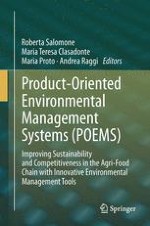2013 | Book
Product-Oriented Environmental Management Systems (POEMS)
Improving Sustainability and Competitiveness in the Agri-Food Chain with Innovative Environmental Management Tools
Editors: Roberta Salomone, Maria Teresa Clasadonte, Maria Proto, Andrea Raggi
Publisher: Springer Netherlands
